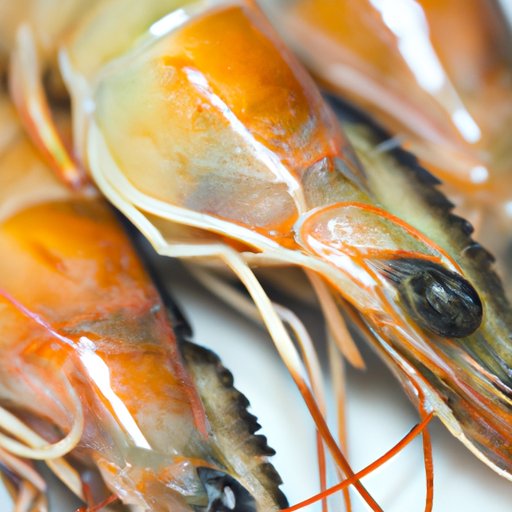Introduction
A heart-healthy diet is crucial for maintaining good health and preventing heart diseases. For many people, achieving and maintaining a heart-healthy diet can be challenging, but incorporating certain foods such as shrimp can make it easier. In this article, we will explore the nutritional benefits of shrimp for heart health and provide evidence-backed information as to why you should consider adding shrimp to your diet.
5 Reasons Why Shrimp is Great for Heart Health
Shrimp is high in protein and low in calories, making it an excellent choice for those looking to add healthy foods to their diet. Here are five reasons why shrimp is great for your heart health:
- Low levels of saturated fat: Shrimp has low levels of saturated fats, which are linked to high cholesterol levels and increased risk of heart disease.
- High levels of omega-3 fatty acids: Omega-3 fatty acids are essential fats that can lower your risk of heart disease and stroke by reducing inflammation and improving triglyceride levels. Shrimp is high in omega-3 fatty acids such as EPA and DHA, which are linked to a healthy heart.
- Rich in vitamins and minerals: Shrimp is an excellent source of selenium, vitamin B12, iron, and phosphorus, which play a vital role in keeping your heart healthy.
- Low in carbohydrates: Shrimp is low in carbohydrates, making it an ideal food option for diabetics or anyone looking to keep their blood sugar levels in check.
- Absence of trans-fat: Unlike other meats, shrimp does not contain trans fats, which are known to increase your risk of heart disease and stroke.
The Nutritional Benefits of Shrimp for a Healthy Heart
Shrimp is packed with essential nutrients that promote overall health, including cardiovascular health. Here is a breakdown of some of the essential nutrients found in shrimp:
- Protein: Shrimp is a high protein food that is critical for muscle growth and repair. A 3-ounce serving of shrimp contains approximately 20 grams of protein.
- Omega-3 fatty acids: EPA and DHA are two types of omega-3 fatty acids found in shrimp that have been shown to reduce inflammation and improve heart health.
- Vitamin B12: Shrimp is an excellent source of vitamin B12, which plays a critical role in red blood cell production and overall cardiovascular health.
- Selenium: Shrimp contains selenium, a mineral that is essential for the proper functioning of the heart and other organs.
- Phosphorus: Shrimp is rich in phosphorus, a mineral that plays a crucial role in strengthening bones and teeth and maintaining heart health.
A typical serving of shrimp (100g) contains approximately 99 calories, 24g of protein, and 0.3g of saturated fat. Additionally, shrimp is low in cholesterol, with one serving containing only 189mg of cholesterol.
How Shrimp Fits into a Heart-Healthy Diet Plan
Incorporating shrimp into a heart-healthy diet plan can be easy and delicious. Here are some tips for adding shrimp to your diet:
- Choose the right type of shrimp: Choose wild-caught shrimp over farmed shrimp as they are generally healthier and more nutritious.
- Prep it the right way: Opt for grilling, steaming, or baking your shrimp instead of frying it.
- Pair it with healthy ingredients: Add shrimp to your salads, stir-fries, pasta dishes, or quinoa bowls to create a healthy and satisfying meal. Pair it with other heart-healthy foods like leafy greens, beans, and whole grains to create a well-rounded meal.
Research-backed Evidence: Shrimp and Heart Health
Several studies have investigated the relationship between shrimp consumption and heart health. A 2015 study published in the Journal of Food Lipids found that consuming 70g of shrimp every day for four weeks resulted in significant reductions in total cholesterol, triglycerides, and LDL (bad) cholesterol levels in adults with high cholesterol. Another study published in the journal Nutrition in 2014 found that shrimp consumption was inversely associated with the risk of coronary heart disease and stroke among Chinese adults.
These findings are supported by other studies that have found that incorporating seafood like shrimp into a balanced diet can reduce your risk of heart disease, stroke, and other cardiovascular diseases.
An Expert’s Opinion: Why Shrimp is Heart-Healthy
To get a health expert’s opinion on the benefits of shrimp for heart health, we spoke to registered dietitian and nutritionist, Jessica Cording, who said:
“Shrimp is heart-healthy because it’s a lean source of protein, and it contains anti-inflammatory omega-3 fatty acids, which can help reduce the risk of heart disease. Additionally, shrimp is low in calories and saturated fat but high in essential nutrients that are important for overall health and wellbeing.”
However, she advises, “It’s essential to choose wild-caught shrimp that isn’t sourced from an area with high levels of contaminants.”
Conclusion
There’s no denying that shrimp is a heart-healthy food packed with essential nutrients to promote optimal health. Incorporating shrimp into your diet can help reduce your risk of heart disease, stroke, and other cardiovascular diseases. Choose wild-caught shrimp, prep it the right way, and pair it with other healthy ingredients to create a well-rounded meal.
(Note: Is this article not meeting your expectations? Do you have knowledge or insights to share? Unlock new opportunities and expand your reach by joining our authors team. Click Registration to join us and share your expertise with our readers.)
